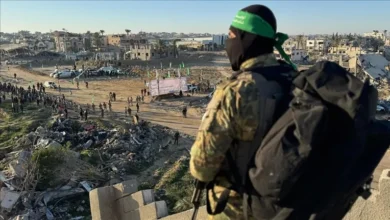WSJ: Trump’s Gaza plan gives Netanyahu a political lifeline
شبكة الخامسة للأنباء - غزة

Israeli Prime Minister Benjamin Netanyahu agreed to terms to end the war only after his political future was secured, following nearly two devastating years of annihilation in the Gaza Strip.
The Wall Street Journal reported that Netanyahu’s approval is largely due to the fact that the heavy lifting of convincing Hamas to accept President Trump’s 20-point plan would fall to “Israel’s Arab neighbors.”
“As long as they are unable to strike a deal, Netanyahu will be in a better position to fend off further international condemnation if he keeps fighting. Much may not change on the ground…and Trump went even further when he unveiled his plan standing beside Netanyahu at the White House: if Hamas does not accept, or if the plan collapses, Israel will have full backing to finish the mission of destroying the Hamas threat,” the report quoted.
Trump said on Tuesday he would give Hamas three or four days to accept the plan.
Hardliners in Netanyahu’s coalition are likely to oppose elements of the plan and could topple the coalition. But the broader Israeli public, including many of Netanyahu’s voters, would see this as sufficient achievement for him to ride a wave of support into re-election, analysts say.
“Bibi has mastered this, no doubt about it,” said Yaakov Katz, a fellow at the Jerusalem-based Jewish People Policy Institute. Western allies’ criticism of Israel has focused heavily on Netanyahu’s refusal to end the war. Domestically, polls show most Israelis believe Netanyahu has resisted ending the conflict for his own political reasons.
“That renders all criticism of him irrelevant, because Israel can say we are ready to end the war, and that we are allied with America and every Arab state,” he added.
The report said that in recent days Qatar and Turkey have tried to pressure Hamas leaders, warning them that this is their last chance to end the war in Gaza, according to Arab officials. They told Hamas that if the movement rejected the deal, they would not be able to continue providing political or diplomatic support.
Hamas described the plan as total capitulation that leaves Palestinians without a credible path to statehood or ironclad guarantees to end the war, officials said. Nonetheless, the movement said it would discuss the plan with other factions and try to respond positively, according to Arab officials.
Trump’s plan poses a dilemma for Arab states and other actors such as Turkey. It calls on the United States to work with Arab countries and international partners to send a “stabilisation force” to Gaza, specifically naming Jordan and Egypt as countries to train a Palestinian police force in Gaza. Sending Arab forces into Gaza would carry political risks and could make them appear as collaborators or occupiers. Egypt, for example, rejects sending any forces to Gaza until Israeli military withdrawal is complete.
“Domestically, the last thing Egyptians or Jordanians want to be seen doing is acting as a security apparatus on behalf of the Israeli army,” said Timothy Kaldas, deputy director of the Tahrir Institute for Middle East Policy.
Overall, the plan forces Arab states to shoulder almost all the major challenges while allowing Israelis to claim they accepted the deal, Kaldas said. “There are ample opportunities for Israelis to point to anything and say: well, you did not meet these criteria,” he said.
Netanyahu extracted major concessions from Arab states, including the pre-release of all 48 hostages — living and dead — held by Hamas, and Israel would maintain a buffer zone including a main corridor along the Gaza-Egypt border. Hamas and other armed Palestinian groups would have to agree to play no role in governing Gaza, and their fighters could receive “amnesty if they relinquish their weapons.”
At the same time, Trump’s plan addresses a key concern for Egypt and other neighbouring states by stating explicitly that “no one will be forced to leave Gaza, and those who wish to leave will be free to do so and free to return.”
From the early days of the war, Egypt feared that the Israeli military campaign would push Palestinians to leave Gaza en masse, burdening the Egyptian government with a massive refugee crisis and denying Palestinians the long-term ability to return home.
Netanyahu had to make some concessions. The plan defines a definitive role for the Palestinian Authority — something Netanyahu vowed he would not allow. He also had to abandon Jewish settlement in Gaza, which would have expelled Palestinians from the Strip, and acknowledged Palestinians’ right to sovereignty and statehood. These are measures that could bring down his government in the short term, suggesting he is risking his political capital to end the war.
Right-wing finance minister Bezalel Smotrich described the plan as a “resounding diplomatic failure” that hands Gaza over to an international force. He also acknowledged the difficulties of implementing it, saying “the enemy’s stubbornness will save us from ourselves again.”
In reality, analysts say Netanyahu’s government is unlikely to survive much longer because of other disputes within his coalition, notably the disagreement over drafting ultra-Orthodox Jews into the army. Many believe the government is unlikely to pass a budget on time before the spring deadline, which would automatically trigger new elections.
However, if hostages are released and the war ends as voters head to the polls, Netanyahu could ride a wave of support that might return him to power.
“If he goes to the election on this, I don’t know how anyone could beat him in that election,” Katz said.
Others are less certain. Avishai Ben Sasson Gordis, a senior fellow at the Tel Aviv-based Institute for National Security Studies, said even if the deal is seen as a victory, it may not be enough for Netanyahu to win the election.
“This is a deal that gives Israel most of what it wanted from the war, but it nonetheless exacts a heavy price in terms of its international standing and social and public deterioration,” he said.
Moreover, the difficulties Arab governments will face in persuading Hamas to fully agree mean it could take weeks or even months to free the hostages or to end the fighting.
“We are closer than ever to ending the war. But the problem is in the details,” said Yoel Guzansky, a senior researcher at the Institute for National Security Studies.






